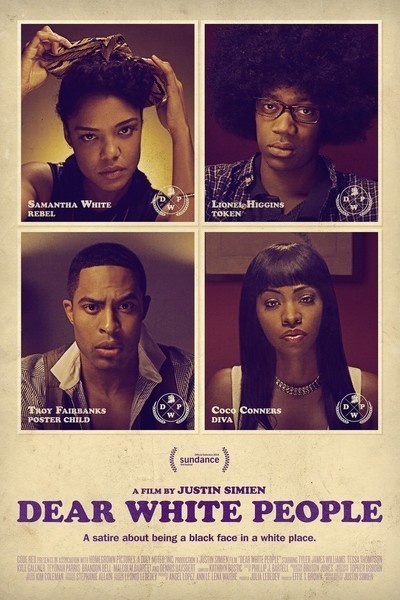Dear White People
Dec 7, 2014
Our Rating: A–
Dear White People, a movie directed by Justin Simien veers off the path of humorous just enough to make you slightly uncomfortable. It takes a prevalent social problem and proves a point about the starkness of a situation without pointing fingers. It draws on ignorance by tying it to stupidity, upbringing, and social hierarchies.
Dear White People takes place at a fictional ivy league university with a predominantly white student population. The traditionally black dormitory is being shut down due to budgeting issues, which instigates protestation from the Black Student Union. This boycott is spearheaded by Sam White, a girl who is extremely vocal about the oppression of the black population by the white majority, and the ignorance that pervades the way she lives. Opposing her is the son of the school’s president, a boy who believes that “racism is over” and that the black students are trying to revive race issues that he thinks aren’t really happening anymore.
While the story seems to be centered on the black versus white perspective, it really focuses on what ignorance does to people. Ignorance is multifaceted, resulting in many different reactions. It makes some characters downplay stereotypical norms to fit in with the majority. It makes others overemphasize those stereotypes to to stand out and make a point. Students try to live up to the legacy of their parents, their peers, and themselves. Ignorance and racism causes people to pursue greatness, or succumb to it. Dear White People manages to teach lessons on the effects of inequality by being humorous about it. It doesn’t make racism a joke, but it refrains from making people uncomfortable about the indirect, offhanded manner that race is considered.
While the movie manages to be relatable and amusing, there are moments that do make people uncomfortable. Sometimes, Dear White People is less witty and clever in its script, and more brutal. A party at the end of the movie ends up being “Hip-Hop” themed, and the appearance of so many young college students cheerfully donning saggy pants, do-rags, and blackface becomes a little too much to bear. But even in its harshness, a poignant point is made that serves to remind people that ignorance is still around, and affects the younger population in ways that are just as important as the issues faced in the Civil Rights Movement.
Because of its relevant social commentary amidst the humorous undertones, Dear White People gets an A–. Sometimes, lessons can be learned through popular media, rather than the harsh reality of news events like Ferguson, or the Trayvon Martin case. Sometimes, a movie can give just as prevalent an outlook on society as current events.












